| |
Roger the Herald's
Notes on Blazonry for Beginners
Minimize
( use  button at top of screen) this
window to return to the game. button at top of screen) this
window to return to the game.
Blazon =
to describe a shield in words using heraldic terms.
Emblazon = to draw or paint a shield from
a blazon.
The simplest type of shield has
only one main charge (the "things" on a shield
are called charges), so it is blazoned with the color of
the field (background), and then the charge and its
color.
Colors:
Gules - bright red
Azure - royal blue or sky blue (not
pastel)
Vert - emerald green
Purpure - royal purple
Sable - black
Metals:
Or - gold (yellow)
Argent- silver (white)
The basic rule is "metal on
color, or color on metal, but not metal on metal or color
on color". "Proper", means in the most
common colors found in nature for that object. The rule
"metal on color and color on metal" is not
always used when the charge is "proper".
Animals were shown in certain
traditional postures, which were not meant to be
realistic pictures of the animals. There were names for
the positions in which the animals were shown. Here are
some of the most common.
rampant-standing on hind legs.
rampant
guardant - standing on hind legs, face
turned toward viewer.
passant - walking.
couchant - lying down.
sejant - sitting.
vert,
a lion rampant or
A
gold lion in profile standing on his hind legs on
a green shield.
|
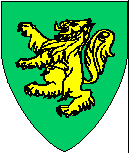 |
The background of the shield was
often divided, and there are names for the common
divisions.
per
bend azure and sable, a lion rampant argent
A
shield divided diagonally, upper left to lower
right, blue on top and black on the bottom, with
a silver lion standing on his hind legs.
|
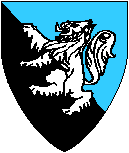
|
Vert,
a tierce azure, in chief three roses or
A
shield divided vertically into three parts, the
first one blue, the other two green, with three
gold roses across the top of the shield.
|
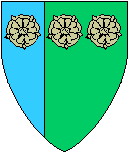
|
Sable,
a chevron inverted or charged with three mullets
(stars) gules
Black,
with a chevron (an inverted V-shape) on which
there are three red stars (the red stars are on
the chevron).
|
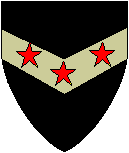
|
Common divisions of shields are
shown below, together with the most common major shapes,
termed Ordinaries. Shield divisions do not have to
follow the metal/color rule, as they are considered to
lie next to each other, not one on top of another.
Ordinaries do follow the rule.

|

|

|

|
Chief
|
Cross
|
Saltire
|
Tierce
|

|

|

|

|
Chevron
|
Chevron Inverted
|
Per Chevron
|
Per Chevron Inverted
|

|

|
Pile
|
Pile Inverted
|

|

|

|
| Pall
|
Per Pall |
Per Pall Inverted |
Note that similar words can mean
the name of a shape on the shield (a fess), how a
shield is divided (per fess), or how smaller
designs are arranged on a shield (fess wise).
Sometimes shields were divided
into four parts, or quartered, to show the arms inherited
from both sides of the family. The upper left quarter is
named first, then the right upper quarter, then the two
lower quarters in the same order.
Quarterly,
1st and 4th, azure, a gryphon or, 2nd and 3rd,
argent, a cross moline gules
The first quarter
and fourth quarters are blue with a gold gryphon,
the second and third quarters are white with a
red cross with split ends.
|
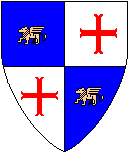
|
|
|


























